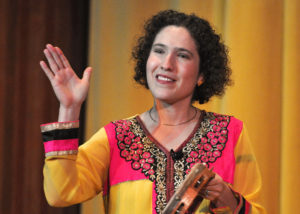
Arianna Ross is a weaver of tales. She tells stories of her Russian-Polish ancestors. She spins yarns about her two years performing and teaching in India. She stitches together cultures from disparate threads, creating a quilt of humanity in the process.
The Poolesville resident, who grew up in Montgomery County attending Walter Johnson High School and celebrating her bat mitzvah at Congregation Beth El in Bethesda, reflected, “In my teens, I [stopped] going to synagogue. I’m very much a cultural Jew, I’m not super religiously Jewish but I absolutely love Rosh Hashanah, Yom Kippur, the Passover seder…. Having the stories of Judaism is so powerful. They teach us lessons about perseverance, about listening, about paying attention.”
These days Ross, 45, is a professional storyteller and founder and CEO of the nonprofit Story Tapestries which, with a nearly $1 million budget, serves children, teens, adults and seniors through performances and creative storytelling workshops.
Story Tapestries programs, she said, empower people to access and share their personal histories and share them as a way to fortify our communities with the rich and colorful threads that, woven together, represent our multicultural community.
Stories Ross heard from her grandparents shaped some of her earliest memories. “Their stories were definitely intermingled with Jewish stories and Jewish folktales and all kinds of other stories,” she said. And her mother, a pianist, tells the tale that Ross became a storyteller because of her grandparents stories.
Yet it took a post-college sojourn in India for Ross to reconnect with her Jewish roots after her teenage rebellion. Following her graduation from Northwestern University, she decided she wanted to explore theater in another culture — and chose India at a mentor’s suggestion. With no scholarship, she worked for a year, used her bat mitzvah money and studied Hindi before taking off. “Ironically, going to India and studying theater in India and working with a theater troupe there, getting to know the Hindu culture and the Hindu religion actually made me more Jewish,” she said.
“In college,” Ross said, “I was a director and an actor. I did some design …. In India, I danced, I performed, I directed, I built sets, I did costuming, I did makeup, I did logistics for tours. I booked an entire tour across the nation of India. I taught little kids. We would go to these small towns and we would literally have to build a stage, a set, everything, even a place to sleep. We performed for thousands of people. I wasn’t performing in English. I was performing in Hindi or Urdu.”
Storytelling, according to Ross, differs from theatrical performance. Instead of memorizing a script with specific lines and dialogue, she said, “Storytellers memorize the story structure, but for every audience you perform for, you shift and change the story. A storyteller does not tell the story exactly the same way each time.”
And while each storyteller approaches her craft differently, Ross shared her own methods: “The way I approach it … I am an embodied storyteller. I have a background in dance and background in theatrical performance, so I’m very big. I choreograph it. When I start, if it is historical fiction or personal narrative or folk tales, each has a different kind of structural process. But for all I start by actually creating what I call a treasure map. I actually draw [my story] out. I draw little tiny little images that represent the different parts of the story. I add basic phrases in between on the arrows,” that connect phrases and episodes of the story. Once she has verbally practiced, it’s back to the map to ensure nothing has gotten lost. Then Ross physicalizes the story: “I use theatrical blocking techniques. I use tableaux, and I put choreographed movement in.”
Fortunately, she has a small built-in audience at home in her 5 and almost 14-year-old daughters and her husband, Alexandre Costa Queiroz. Ross might also invite theater and storytelling colleagues to share thoughts at rehearsals.
Ross likens her work with Story Tapestries to her childhood tzedakah box — where she dropped a few coins in each week for charity. “The idea of tzedakah is at the heart of why I fell in love with the idea of running a not-for-profit. That core value of tzedakah, of giving back, is a daily part of why I do this and what makes me get up” every morning.
“Our stories,” Ross said, “make you recognize the value and the importance of who you are. And that’s where the idea of Story Tapestries came from, that idea of finding your voice, telling your story.”
The ethos she’s woven into her organization’s mission reflects Ross’ Jewish values: “Everybody has a story to tell. Everybody’s story is valuable. Some of our stories are steeped in hundreds and hundreds of years of tradition and culture. Some of our stories you have to dig through … to figure out where your family story fits in.”





